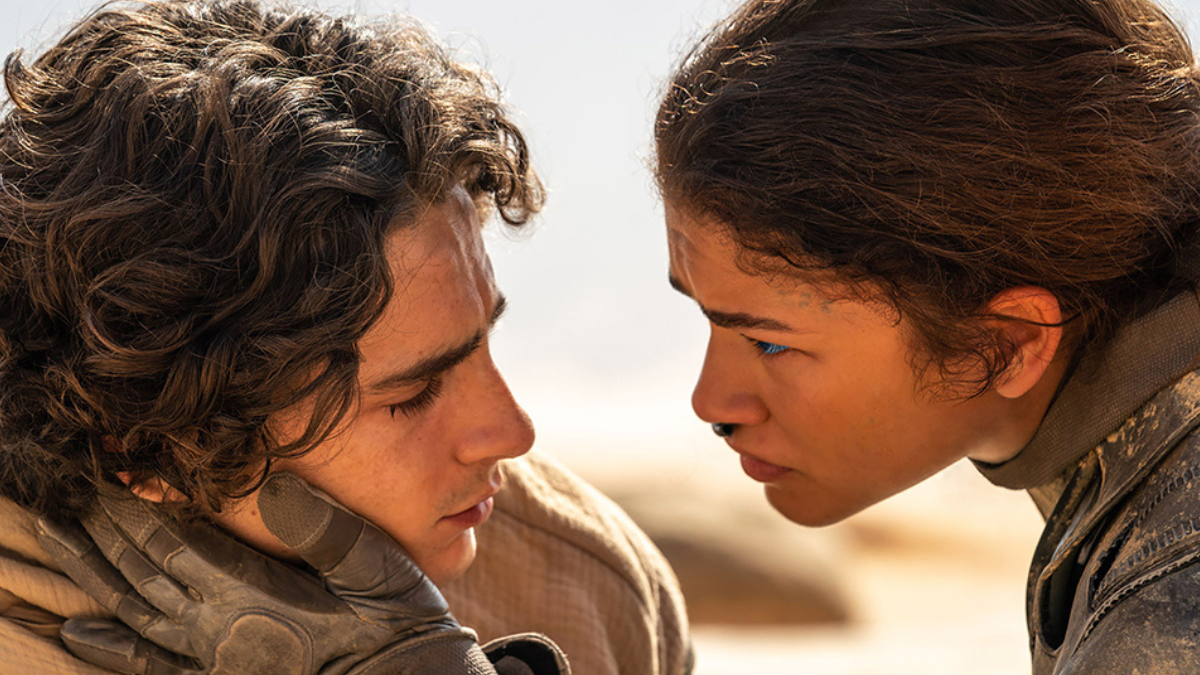Denis Villeneuve’s 2021 sci-fi epic, Dune, redeemed the franchise in the eyes of many fans. David Lynch’s crack at the material in the ‘80s has since reached cult classic status but is one of the most maligned films from the director.
The 800-plus page book was distilled down to a two-hour movie that skips over the intricacies of Paul’s rise from a Duke’s son to an effective Emperor of the galaxy. This wrong is what Villeneuve is righting by splitting his films into two parts. The first Dune, starring Timotheé Chalamet as Paul Atreides, shows his journey to the desert planet Arrakis where he learns that his mother, Lady Jessica (Rebecca Ferguson), has bred him to be the Kwisatz Haderach.
This is a messiah of sorts whom Jessica’s order of the Bene Jesserits wants to control, though Paul soon becomes too powerful even for them. He and his mother escape assassination from the envious Harkonnens and are adopted by the indigenous people of the desert known as the Fremen. And that’s only Part One.
Dune Part Two will show Paul not only taking up the mantle of Duke but leading all of the Fremen out of the bloody conflict with the Empire. Even before Part Two premieres, Dune has been accused of white saviorism concerning Paul’s story. We all experienced this when watching the deterioration of Game of Thrones. Daenerys Targaryen (Emilia Clarke) takes it upon herself to be Queen Mother and save other cultures from enslavement. But this takes agency away from the native people of the area.
Were the Fremen just waiting around for some 15-year-old white boy to save them? It certainly appears that way if you have only engaged with the films. But Frank Herbert’s books have a different thesis, one that audiences will finally see if Dune 3 is to become a reality.
Paul becomes a villain in Dune Messiah
The conclusion of Herbert’s first Dune book ends pretty much like the Lynch movie. Paul decides to marry the Emperor’s daughter, Princess Irulan, to take control of the galaxy. This plan allows him to protect the Fremen and keep Chani as his concubine, who has already given birth to one of his sons. Villeneuve has so far remained true to this vision and stayed faithful to these events. However, the first Dune book is only part of the story.
The following book, Dune Messiah, wraps up Paul’s story and is integral to his character arc. This conceivably reflects the reason why Villeneuve intends to make a third film. There is no sense in telling this story if viewers don’t get the full picture. Paul isn’t the hero. He’s the villain.
Absolute power corrupts absolutely is a key theme of Herbert’s work. His story on Arrakis shows what happens when even the best-intentioned people gain access to it. If Villeneuve only made the first two movies, Paul would be guilty of turning into crazy lady Dany. But that isn’t the destiny that will be covered in Dune 3.
In Dune Messiah, Paul isn’t exactly what you would call a benevolent leader. True to his visions in the first Dune film, he raises an army that worships at the altar of his father’s bones. With Chani at his side, Paul becomes the supreme leader and creates a religious jihad that spreads throughout the galaxy. All in the name of protecting the Fremen, the forces operating under his name commit genocide across entire planets.
By the conclusion of the book, Paul’s once pure intentions have turned into a beast so big that even he can’t control it anymore. Though he didn’t want religious zealots to cover the galaxy in hellfire, his figure as the Messiah has become so big that nothing can stop it. This realization doesn’t absolve him of any responsibility, either. The Atreides dynasty continues after him through his twins mothered by Chani, who dies in childbirth.
As for Paul, he is rendered completely blind and walks into the desert. But the whole point of this saga is that his actions have consequences. The rule of Atreides does not die out with him. His children take his place, with Leto II becoming supreme ruler. And if you want to really get into the nitty-gritty of Dune lore, follow what happens to the next generation of the Atreides — namely Leto II becoming a giant sandworm hybrid known as God Emperor who lives for thousands of years.
No, Dune is not a white savior franchise. It is the antithesis of one. But to get there, we need to see Paul’s story fully realized. Dune Messiah needs to be committed to film to see Herbert’s intention come to life. Luckily, Villeneuve reports that Dune 3 has been greenlit, and a script is in the works. We are that much closer to Paul’s villain error and, if we are lucky, Mr. Sandworm himself, God Emperor.
